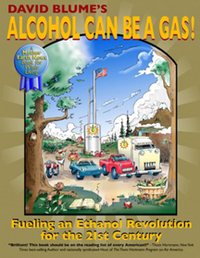Alcohol Can Be A Gas - Book Review
 |
Is Alcohol the Future of Fuel?
By L. Hunter Lovins
Special from TheCuttingEdgeNews.com
In his revised edition of Alcohol Can Be A Gas, David Blume provides an accurate, comprehensive case for the effective use of alcohol as a liquid fuel source. This book is far more than a survey of the basic issues surrounding ethanol.
 L. Hunter Lovins |
Blume's insistence on “designing farming as a method of harvesting solar energy for multiple uses” (p.31) takes the book beyond single-issue thinking and offers integrated solutions to the challenges facing those seeking to grow food, produce and use liquid fuels, treat sewage, and more. The discussion in Chapter 3 provides a stand-alone manual on how to do farming right.
Blume's analysis refutes the old myth that alcohol production detracts from growing food. He also dispenses with the inaccurate assertions that alcohol production necessarily requires more energy than is obtained; that there isn't enough arable land; that it's ecologically unsound; that making alcohol takes away from food crops; that alcohol negatively impacts global warming; and more.
Book 4, “Using Alcohol as a Fuel” (Chapters 13 through 25) provides an example of the thoroughness of Blume's knowledge and coverage of the various topics relating to alcohol production and use. Because fuel injection systems, compression, and ignition are at the heart of the internal combustion engine, it is important to understand the issues involved in how switching to alcohol fuels might affect these systems. The presentation in these chapters is straightforward, easy-to-understand, and detailed in covering the important issues relating to carburetion and fuel injection.
Close-up photographs, charts, diagrams, tables, exhaustive references, and humorous cartoons makes the chapters both readable and authoritative. The author appears to have studied, tested, and analyzed nearly every conceivable combination of technologies. The book draws from this experience to give many important tips and techniques for preventing problems or dealing with the diverse challenges of using alcohol as fuel.
The section of cogeneration in Chapter 24 provides an additional example of the level of detail and relevance in the technical aspects of the book. Covering the issues surrounding combined heat and power, Blume offers timely, effective, well-documented, and well-illustrated analysis, replete with references, examples, photographs, and useful case stories.
The descriptions of “Community-Support Energy” projects in Chapter 29 nicely add to the overall presentation. By emphasizing community-based initiatives, the book places an important focus on what local citizens can do on their own, with or without government assistance. Linking alcohol production with community-supported agriculture provides an opportunity for efficiency, prot, and sustainability at the local level. This places the focus where it can be most useful—at the local level, in neighborhoods, farms, and villages where families, work, grow food, and live their lives.
Alcohol Can Be a Gas: Fueling an Ethanol Revolution for the 21st Century. David Blume. International Institute for Ecological Agriculture. 2007. 640 pages.
For additional information about David Blume and his work visit www.alcoholcanbeagas.com
About L. Hunter Lovins
L. Hunter Lovins is President and founder of the Natural Capitalism Solutions. NCS educates senior
decision-makers in business, government and civil society to restore and enhance the natural and
human capital while increasing prosperity and quality of life. In partnership with leading
thinkers and implementers, NCS creates innovative, practical tools and strategies to enable
companies, communities and countries to become more sustainable.
Trained as a sociologist and lawyer (JD), Hunter co-founded the California Conservation Project (Tree People), and Rocky Mountain Institute, which she led for 20 years. Lovins has consulted for scores of industries and governments worldwide. She has consulted with large and small companies including the International Finance Corporation, Royal Dutch Shell, Interface, Clif Bar and Wal-Mart. Governmental clients include the Pentagon, U.S. Environmental Protection Agency, Department of Energy and other agencies, numerous cities, and the governments of Jamaica, Australia, and the U.S. She also serves an advisor to the Energy Minister of the Government of Afghanistan.


